
When browsing the internet in normal mode, your browser logs all your data, such as passwords, cookies, and timestamps. However, in incognito mode, the browser does the opposite. It won’t store any browsing data on your device.
While this offers a level of privacy, it doesn’t guarantee total online anonymity or prevent online tracking. Hence, you may ask, “What does switching to incognito mode truly mean if it doesn’t offer any more protection than a normal tab?”
Let’s compare private mode vs. normal browsing mode, discuss how going incognito works, and learn its benefits. We also provide details about the best VPNs you can use for added security and privacy while surfing the internet.
Difference between incognito and normal browsing mode
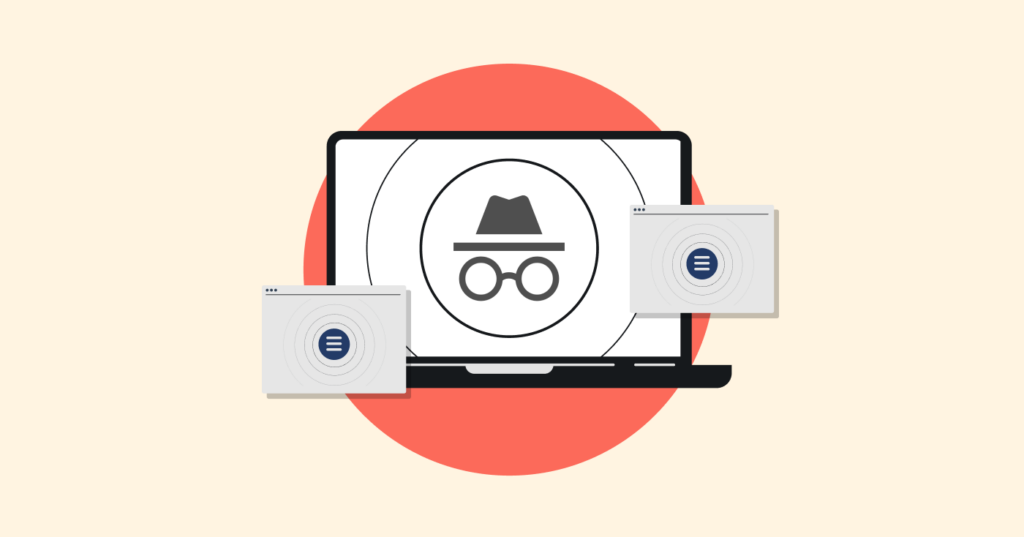
What is incognito mode?
Incognito or private mode is a version of your browser that lets you access the internet privately. In other words, you can visit several web pages, click multiple links, and shop online without your browser keeping records. It disables temporary files, trackers, and third-party toolbars.
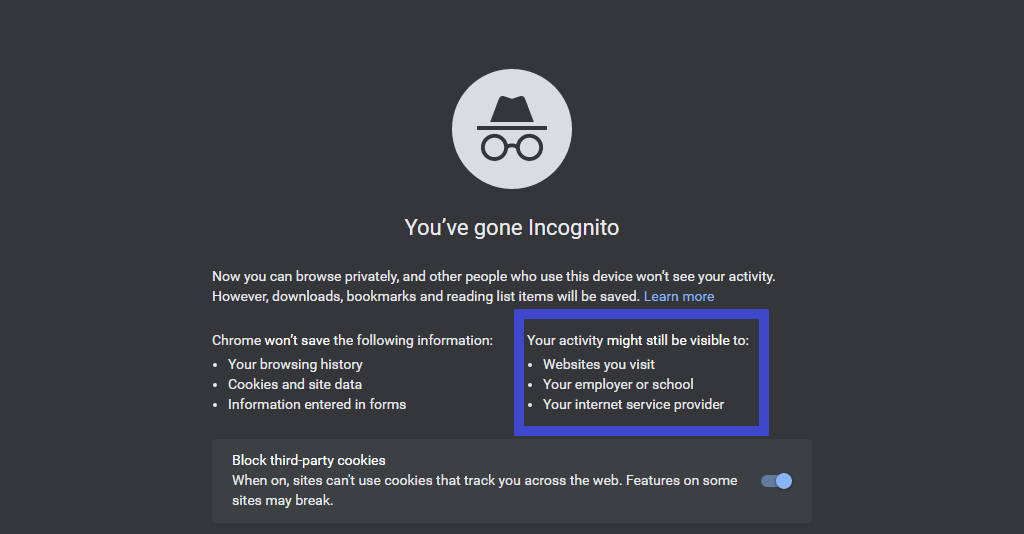
Once your browsing session ends in incognito mode, there’ll be no search history or cookies on your device for anyone to trace. However, this doesn’t make you anonymous.
The concept that incognito mode on your browser makes all your activities secret is a myth. Your internet service provider, companies, or the websites you visit can still view your online activities and collect your information without authorized access.
If you’re looking to mask your online data effectively, it’s best to rely on a VPN. A VPN helps to mask your data, making it unreadable to third parties. By implication, no one, including search engines, can track your behavior in incognito mode. We recommend ExpressVPN, as it offers top-notch privacy and security features like 256-bit military-grade encryption, a no-logs policy, IP/DNS leak protection, and a kill switch to protect your data from prying eyes.
What does incognito mode do?

At this point, you may wonder, “If a VPN helps to hide my online activities, where does incognito mode come in?” Don’t be quick to conclude that going incognito isn’t necessary. When you enter this mode, it starts a new browsing session and doesn’t save the following:
- Personal details filled in forms: Whether filling out an online form or inputting your checkout details on a website, it won’t save your username, phone number, card details, and home address.
- Cookies: Cookies help websites remember your preferences and track your activity. For example, they store information like your login credentials or items in a shopping cart.
- Search history: This covers every prompt you type into search engines.
- Passwords: Even if you have all your passwords saved on your device, you’ll need to log into all your personal accounts again without autofill.
- Bookmarks: Any bookmark you create in this mode will be lost once you revert to the normal browsing window.
- The links of recently visited sites: You may have noticed that webpage links turn blue to purple whenever you click them in Google. In incognito, you’ll be unable to identify a site you’ve visited unless you indicate otherwise.
Remember that the information an incognito mode doesn’t save can vary among browsers. We recommend you check the specific settings of your preferred browser to get accurate information on what is retained or not in incognito mode.
Another different factor is the term for incognito mode. While “incognito” is the most popular term, other browsers have different names for the privacy feature. For easier access, here are the various names for incognito in significant browsers:
| Private mode name | Browser |
|---|---|
| InPrivate | Microsoft Edge |
| Incognito | Google Chrome |
| Private Browsing | Mozilla Firefox and Apple Safari |
| Private | Opera |
NOTE: Apart from using web browsers, you can also use incognito browsing on services like YouTube, Reddit, Google Play Store, and Google Maps.
Benefits of using incognito mode

There’s no harm in using private mode to surf the internet all day. While it doesn’t offer complete privacy, you’ll find it helpful against snoopers at school watching Netflix, so nobody knows what you’re doing at work or home.
As long as you’re using an updated browser, here are situations where incognito mode can be useful:
- Use a shared gadget or public computer: Private mode is an excellent option for individuals who share devices like mobile phones, tablets, and laptops with someone else. It’ll also be useful if you often use public computers at cafes, libraries, and hotels, as others cannot view your browsing history.
- You want to shop online: If you want to purchase an item without your friends or family members’ knowledge, you can do so in incognito mode. Since it prevents cookie storage, any targeted ads — accidentally revealing the items you’ve been searching for — won’t likely appear on your device.
- You can protect sensitive information: Whenever you exit a private mode browsing session, the browser wipes your temporary files, login data, and cookies from your gadget. This automatically logs you out from any account or site you previously accessed. For example, if you were using Facebook in private mode, and another user wishes to visit the platform, they’ll have to input their login details rather than use your account.
- You want to research confidential matters: You may have personal topics you want to look up online, such as legal cases or medical conditions. Private mode will come in handy.
- Multiple accounts on a particular service: Private mode helps you log into the same platform while keeping your other account open on the regular window tab. For example, if you have a business and a personal social media account, you can use it to separate your work from your profile.
- Book hotel rooms and flight tickets: It’s no news that many websites use cookies to track your visits and adjust prices based on your search history. Using private mode, you can start each browsing session with a clean slate, reducing the likelihood of paying hiked accommodation prices based on your previous searches.
- Own a service or website: Going incognito is an excellent way to test user experience and analyze their perspective of your website without the influence of your data and stored information. That way, you can preview your most recent updates and verify how they appear to visitors.
- You can enjoy extension-free browsing: Entering incognito mode deactivates toolbars and extensions, affecting your browsing experience.
- Find fresh content: Search engines track your online behavior and show you content based on your preferences. If you often watch anime on social media, once you check your Explore, you’ll see it’s filled with several types of anime content. Since Incognito mode doesn’t track your history, you’ll come across new content that isn’t based on your previous activities.
Simply put, private mode is necessary to keep your local browsing habits confidential from your employer or household.
Disadvantages of using incognito mode
Like every coin has two sides, it’s the same with privacy mode. Here are the limitations of incognito mode:
- It leaves your device vulnerable to malware: As long as you don’t have antivirus software, incognito mode won’t make you less susceptible to ransomware and malware attacks.
- Third parties can view your internet activities: The idea behind private mode is to keep your activities confidential from others using the same device. For example, administrators can still see what you’re doing, given your computer is connected to the office network.
- It erases your browsing session: Imagine going through the hassle of inputting your details and logging into platforms again whenever you step out. That’s what happens in incognito mode. It makes you start all over after exiting your tabs.
- Your IP address remains visible: Private mode doesn’t hide your IP address. Hence, every user on your network can see your IP address and quickly identify your location. To encrypt your internet connection and data, you’ll need a VPN.
- It doesn’t disable tracking completely: Third-party advertisers and websites can still track your search history to send targeted ads. Going incognito cannot erase your digital footprint. It just gives you a more private browsing experience.
- Your downloaded files will remain on the browser: Once you exit your browsing session, every file, video, song, or image you download will not wipe off. That means anyone who subsequently uses the device can see what you’ve been up to.
From all these, one can infer that private mode functions to limit people from snooping on your data rather than hide your data on the internet. So even when you go incognito, you’ll still need a VPN and antivirus software for extra security and privacy. That way, you can prevent cybercriminals and unauthorized persons from accessing your information.
What is regular browsing mode?

Regular browsing mode is typically your default browser. This tab keeps track of all your cookies and data to improve your browsing experience. Information like your username, password, and card details will remain on the browser regardless of whether you exit or not.
Accessing regular mode on your device is very straightforward. All you need to do is launch your browser, and you’re in!
Benefits of using regular browsing mode
The following are the pros of using the regular browsing mode:
- It makes filling out online forms easy. Rather than racking your brain to remember passwords, this browser offers an autofill option.
- Since it saves your search history, you don’t need to go through the hassle of finding recently visited web pages. It shows a record of your browsing history.
- It lets you save bookmarks, making referencing simple.
- By tracking your cookies, it puts targeted ads in your face. Undoubtedly, you’ll find this helpful for getting recommendations for a service or product.
This browsing mode is more suitable for regular, everyday use when you want your browser to retain information. In short, you’ll appreciate its convenience for remembering your website login information and preferences.
Disadvantages of using regular browsing mode
The main downside to using a normal browsing mode is it potentially compromises your privacy, as it retains your browsing history and stores cookies. Here are other limitations of this browsing mode:
- You’re more susceptible to tracking by websites and advertisers. Hence, you may struggle with intrusive and annoying ads, affecting your online experience.
- It makes your data accessible to anyone using the public or shared computer. As a result, anyone can collect and use your details for fraudulent activities.
- You’ll find it challenging to research sensitive issues and visit specific sites without leaving digital footprints.
- Except you manually erase your browsing history, it’ll remain accessible to third parties.
Now that you know there’s more to incognito and normal browsing mode than their theme let’s walk you through how to activate them on popular browsers like Safari, Chrome, Firefox, and Microsoft Edge.
Google Chrome incognito vs. normal browsing mode
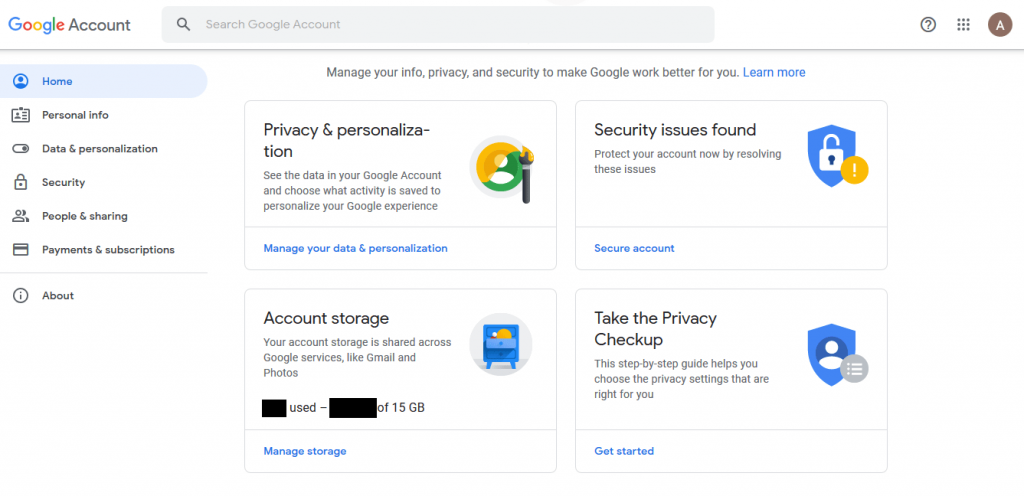
Undoubtedly, Google Chrome is the most popular browser worldwide. It’s no wonder more people are familiar with its incognito mode than other browsers’ private mode. It was released in 2008 as a cross-platform web browser. It works excellently on different mobile devices, computers, and operating systems.
Chrome is the default browser for Android devices and Chromebook laptops. It offers basic features like a forward button, back button, refresh button, bookmarks, history, and toolbar. However, many users have criticized the browser for practices infringing on their privacy. For example, Google has a history of collecting behavioral data for marketing purposes.
Thankfully, its incognito mode lets you surf privately without tracking your history, cookies, or site data. But you still need to block third-party cookies and social trackers manually. If you forget to disable these trackers, using Chrome’s incognito mode won’t differ from its normal mode.
The following are crucial differences between going incognito on Chrome and using the regular browsing mode:
| Features Stored | Incognito Mode | Normal Browsing Mode |
|---|---|---|
| Cookies | No/Yes* | Yes |
| Downloads | No** | Yes |
| Bookmarks | No | Yes |
| Website data | No | Yes |
| Information filed in forms | No | Yes |
| Browsing history | No | Yes |
* Chrome allows you to block cookies in incognito, but you must configure your browser for this manually via settings.
** Although it doesn’t save the history of the files you downloaded, the files will be on your device.
Safari private browsing mode vs. normal browsing mode
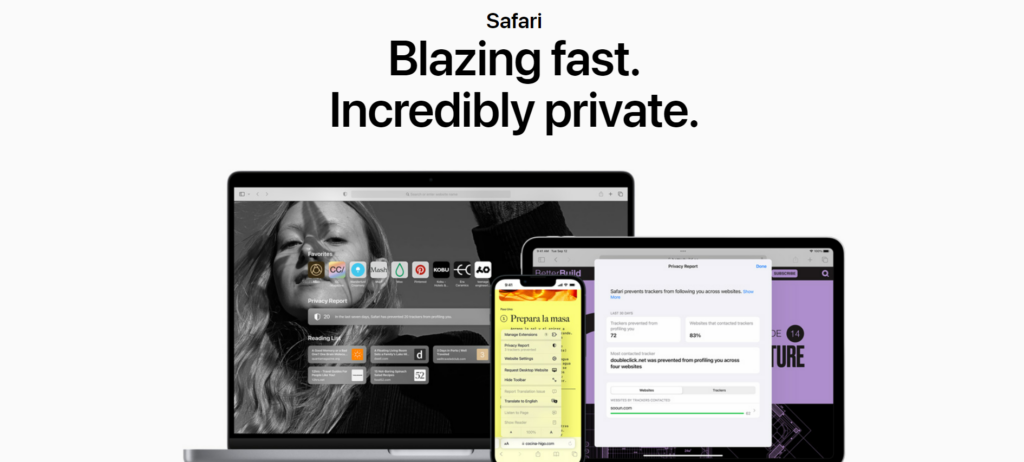
If you use a MacBook or an iPhone, your default browser is Safari. Apple launched this browser in 2003, and since then, it has gone through multiple upgrades to give users an excellent browsing experience in every session.
This browser offers a decent level of privacy. Although it’s not as private as Tor and Brave browsers, it minimizes how third parties access your data to a great extent. On top of that, it gives you the option to adjust its private browsing mode.
For example, you can modify how often you want websites not to track your information like contact details or location and tell it whether you want all your web history deleted. Rest assured, you’ll enjoy maximum security on all your devices by adding a VPN to your Safari’s private mode arsenal.
Here are Safari’s private browsing mode features that help separate it from normal mode:
| Features Stored | Private Browsing Mode | Normal Browsing Mode |
|---|---|---|
| Site data | No | Yes |
| Browsing history | No | Yes |
| Cookies | No* | Yes |
| Downloads | No** | Yes |
| Bookmarks | No | Yes |
| Information filled in forms | No | Yes |
* Safari’s private browsing mode allows you to disable third-party cookies manually.
** When you download files in Safari’s private mode, it never saves your details, but they’ll appear on your computer.
Mozilla Firefox private browsing mode vs. normal browsing mode
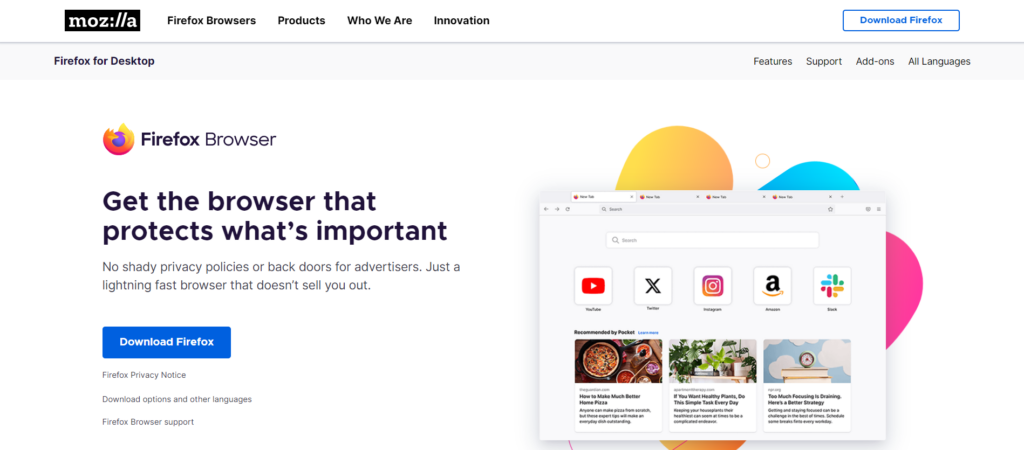
Mozilla Firefox is a safe browser when it comes to protecting your data. Since its release in 2004, the browser has consistently upheld its users’ privacy. Unlike Chrome, Firefox is a non-profit platform. That means it never collects your personal browsing information to make a profit.
Besides, it’s one of our top-ranking browsers for private browsing, as it provides several security functionalities and an intuitive user interface. For example, it never keeps track of users’ personal information, like the websites you visited or the activities you performed across the internet, even in normal browsing mode.
You’ll also appreciate its bookmark feature for quickly accessing website pages you visited and fetching information from them. We recommend you use Firefox’s private browsing window with a robust VPN, like ExpressVPN, for increased online anonymity.
Below, we’ve highlighted all the key differences between Firefox’s browsing modes:
| Features Stored | Private Browsing Mode | Regular Browsing Mode |
|---|---|---|
| Downloads | No* | Yes |
| Browsing history | No | Yes |
| Bookmarks | Yes | Yes |
| Information filled in forms | No | Yes |
| Cookies | No | Yes |
| Site data | No | Yes |
* On Firefox’s private browsing homepage, your downloaded files will be erased once you exit the tab.
Microsoft Edge InPrivate browsing mode vs. normal browsing mode
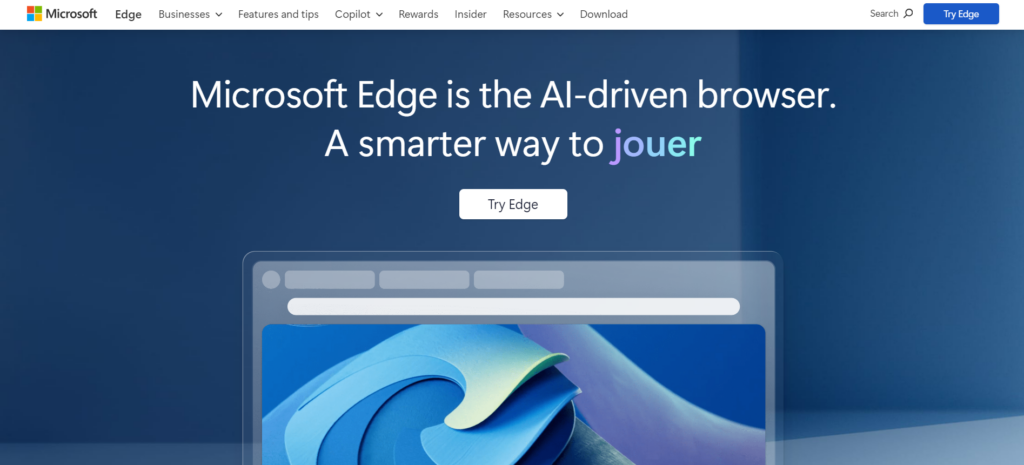
They say: “Internet Explorer broke up with Microsoft Edge because it couldn’t handle being in the shadow of a faster, more modern browser.” In other words, Microsoft Edge is the successor of Internet Explorer.
It was introduced in 2015 to provide users with a faster and more efficient browsing experience. The browser has several private features and benefits, making it an ideal alternative to more popular browsers like Safari and Chrome.
Its InPrivate browsing mode lets you surf the web without saving any data or temporary files. Although the browser stores your downloads, you’ll find it convenient to bar others from seeing what you do online.
Moreover, Edge integrates excellently with Microsoft Defender, a powerful anti-virus solution. With it, you can keep your activities private and protect your gadgets from malware and other security threats.
Let us walk you through the key features of Microsoft Edge’s normal mode and InPrivate browsing below:
| Features Stored | InPrivate Browsing Mode | Regular Browsing Mode |
|---|---|---|
| Browsing history | No | Yes |
| Bookmarks | No | Yes |
| Downloads | Yes | Yes |
| Information filled in forms | Yes | Yes |
| Cookies | No | Yes |
| Website data | No | Yes |
Private browsing mode and online security

If you check significant browsers like Chrome and Safari, you’ll notice they clearly outline the activities that’ll remain visible to others in private mode. Browsers can’t guarantee total online security, as they function as data-collecting tools.
They gather your data and profit from marketing agencies by displaying personalized and customized ads on your screen. So, it’ll be risky to rely solely on them for security. Whenever you go incognito, your browsing session data is visible to the following parties:
- Your school or employer
- System administrators
- Government agencies and the government
- Your internet service provider
- Websites and services you visit, including the agencies that send ads on those sites.
The personal information these parties can see and collect includes:
- Your IP address, which sites and platforms can use to identify your real location.
- Your personal identity, for example, signing into a service using a mobile number or email account.
- Your browsing activity while using a web service, such as the links you clicked and images saved.
Remember that regardless of whether you use privacy mode on your browser, third parties can still track your data and collect information about you. Even if you opt for ad blockers, it only prevents advertisements from displaying on web pages.
To keep your online activities private, it’s best to pair incognito mode with a VPN. Aside from encrypting your internet traffic, it’s an outstanding tool for warding off snoopers. Besides, you’ll find it easy to set up on your device. It may take a few more steps compared to switching to private mode, but the increased level of privacy is worth it.
VPN vs. Incognito mode: Which works better?

The benefits of using private mode and a VPN are quite different. Yes, they limit the amount of online tracking you encounter. However, you can’t compare the protection you’ll enjoy using a VPN to going incognito. While you can do away with privacy mode, concealing your identity without a VPN is impossible. We recommend you use privacy mode and a VPN simultaneously for best results.
In the table below, we’ve outlined the essential differences between an incognito window and a VPN to pick one that best suits your needs.
| Features | VPN | Incognito Browsing |
|---|---|---|
| Evades government censorship | A VPN lets you bypass any government restrictions on social media and streaming platforms. | No |
| Conceals your IP address | This is a VPN’s significant functionality. It helps to hide your IP address, making it challenging for individuals lurking on the internet to access your personal information. | No |
| Protect against cyber attacks and malware | Many VPNs offer malware and ad blockers to prevent you from losing important data or files. Considering this is a subsidiary feature most VPNs provide, getting antivirus software for extra protection is best. | No |
| Bypasses geo-restrictions | Rather than letting platforms greet you with geo-restriction error messages like “You don’t have permission to view this content,” a VPN enables you to unblock any of your favorite services regardless of location. | No |
| Provides superfast browsing speed | Since VPNs encrypt your data, you will likely experience slow connection speeds. However, with premium VPNs, you won’t notice the speed difference. | No |
| Encrypts your data | A VPN creates a secure tunnel between you and your internet provider, hiding your real IP address. It often uses 128 or 256-bit encryption, which is hard to crack. | No |
| Stops your browser from saving your browsing history | No | Once you exit the private browsing mode on your browser, it will immediately wipe off all your browsing data without leaving traces. |
Best VPNs for added privacy and security
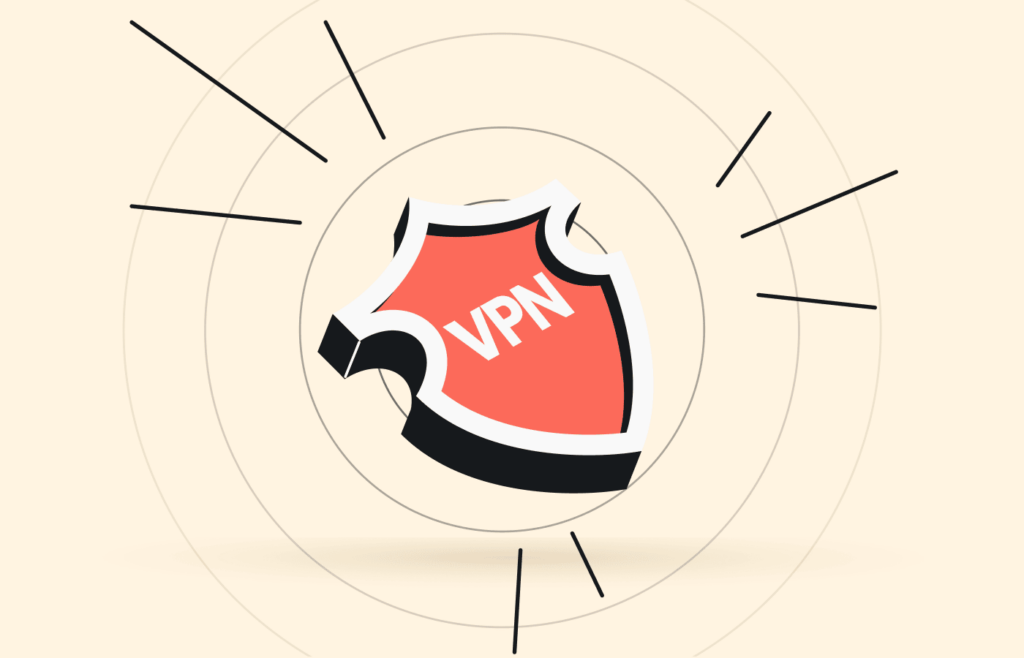
1. NordVPN

It is one of the safest VPN providers for unrestricted and secure browsing. The VPN has robust encryption technology and many other impressive features to enhance your private browsing experience.
Pros
- Unblocks all popular streaming sites
- Ad-blocker and unlimited data
- Observe high-quality security practices
Cons
- No free trial
NordVPN is our top pick for VPNs you can combine with private mode. You can’t go wrong with this service if you want to access many privacy features to erase your digital footprint completely. This VPN offers quality functionalities like a kill switch, advanced encryption ciphers, and cutting-edge tunneling protocols to keep your connection private without forgoing speed.
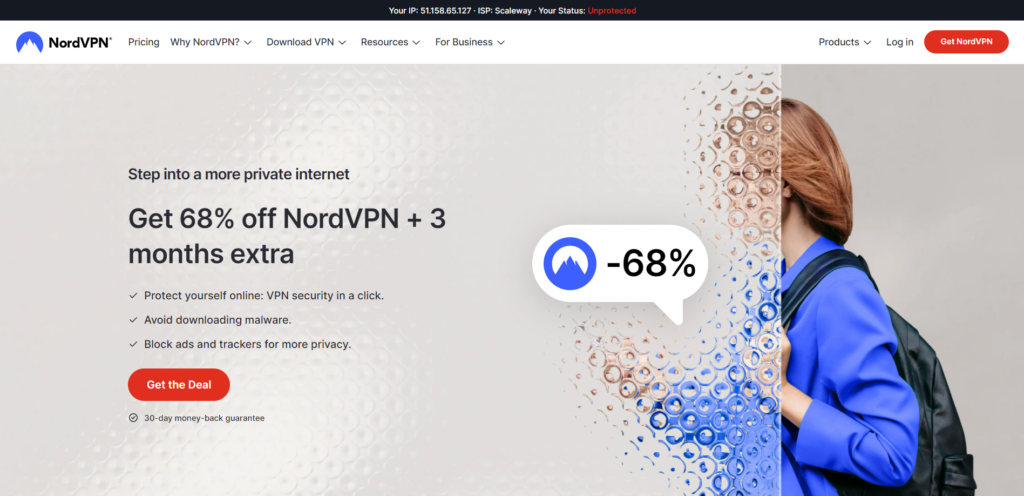
For security and privacy-conscious individuals, it has a double VPN feature, which, as the name implies, fortifies your internet encryption for extra anonymity. You’ll appreciate NordVPN’s military-grade encryption for keeping malicious websites and trackers at bay.
We found its speed reliable for internet browsing without experiencing slow-loading web pages. The provider supports ultra-secure VPN protocols like NordLynx, OpenVPN, and IKEv2/IPsec. With these choices of protocols, you can surf the internet, download files, and stream online events privately and secretly.
An intriguing fact about NordVPN is it functions as a multi-purpose tool. Apart from ensuring online privacy, it has Threat Protection for blocking intrusive ads.
2. ExpressVPN

This VPN network offers blazing-fast servers and stealth online protection while streaming or downloading content.
Pros
- Responsive customer support
- Unlimited data bandwidth
- Allows torrenting
Cons
- Relatively pricier subscription plans
Ranking second on our list is ExpressVPN. Thanks to its robust privacy features, you can limit your activities to only your eyes. The provider boasts 3,000+ servers in 107 countries across 160 locations worldwide, making it an excellent option for location spoofing. Not only does it mask your real IP address, but it also delivers fast and stable connections.
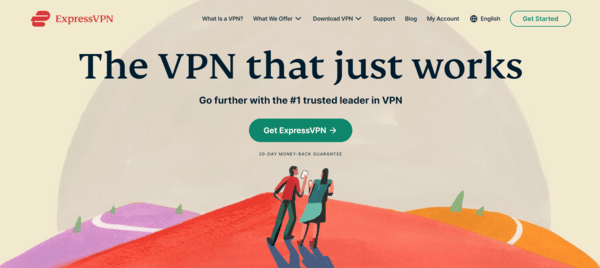
Therefore, you can stream popular platforms like Netflix, Hulu, Amazon Prime Video, Disney+, and HBO Max without restrictions. VPN uses 256-bit AES encryption alongside a Lightway VPN protocol. Rest assured, your personal data will be safe and anonymous from your ISP provider and the government.
What’s more? The VPN has an audited no-log policy to keep your original IP secure and protect your identity. You won’t experience IP, DNS, or WebRTC leaks while connecting to ExpressVPN’s servers.
Another feature that pairs the VPN nicely with private browsing mode is its compatibility with major devices. It integrates excellently with Windows, Android, iOS, macOS, and Linux devices. In other words, you don’t need to worry about using ExpressVPN alongside your preferred browser.
3. ExtremeVPN

One of the latest additions to the VPN market, it is rising to the top with its robust security and privacy features. It also has super-fast connections across all servers.
Pros
- Affordable pricing and plans
- Unblocks popular streaming services
- Supports port forwarding
Cons
- No double VPN/Dedicated IP
ExtremeVPN has several privacy features, including a kill switch, split tunneling, DNS, WebRTC, and IPv6 leak protection. Besides, the service’s headquarters is in the British Virgin Islands, which is popular for its strict laws on individuals’ anonymity. If all these don’t make the VPN private enough, then what could?
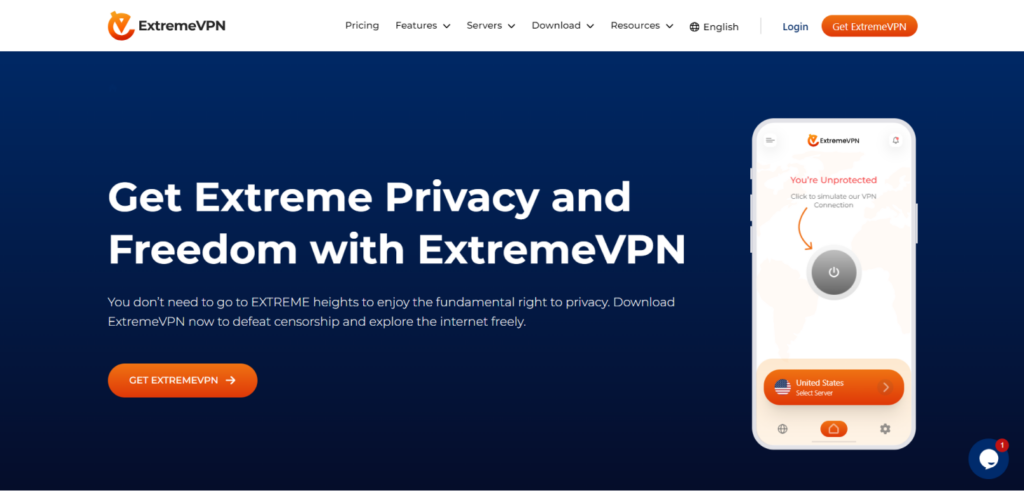
In addition, you’ll find the VPN easy to use. It has a simple interface that anyone, even a VPN novice, can navigate. ExtremeVPN has over 6,500 servers across the globe, giving you thousands of IPs to choose from so you can enjoy total online privacy.
Regarding security, the provider uses the highest level of encryption in the industry. This means you can enjoy complete anonymity from the government, your ISP, trackers, cybercriminals, and other spying agencies. The VPN also uses obscure servers, making it difficult for sites and platforms you visit to detect you’re using a VPN.
And the best part? ExtremeVPN’s single subscription can protect up to 10 devices simultaneously. Let’s say you use a shared computer and tablet. You don’t need to subscribe to the service twice to browse privately on these devices. All you need to do is sign in on both gadgets using one subscription and enjoy greater value for money!
FAQs
Yes. Remember, every browser’s private mode has a distinct interface from its normal mode. So, by just peeking over your shoulder, anyone can know you’re browsing in incognito mode. If you forget to exit the private mode window on your computer, a person can see your sessions and activities.
It’s also possible to still find your browsing history in the DNS cache even after you close the incognito tab on a public device. On the bright side, it would be difficult for anyone to tell whether you accessed particular websites or services in incognito mode or not.
Sadly, yes. Private mode only helps to hide your identity without storing your search history, cookies, or session data on your device. However, it doesn’t provide any protection against malware or viruses. You’ll need an antivirus software for that.
Of course! Aside from Mozilla Firefox, browsers like Brave and Tor are excellent for anonymity. They take privacy a step further by blocking trackers and ads by default. They also come with built-in features like shields, making it more challenging for anyone to trace your online activities.
The following are the benefits of using private browsing mode:
1. To stop intrusive ads and improve your browsing experience.
2. To enjoy reasonable prices on flights and hotels.
3. To ward off nosy parties while using public or shared computers.
4. To research confidential matters without leaving any digital footprints.
